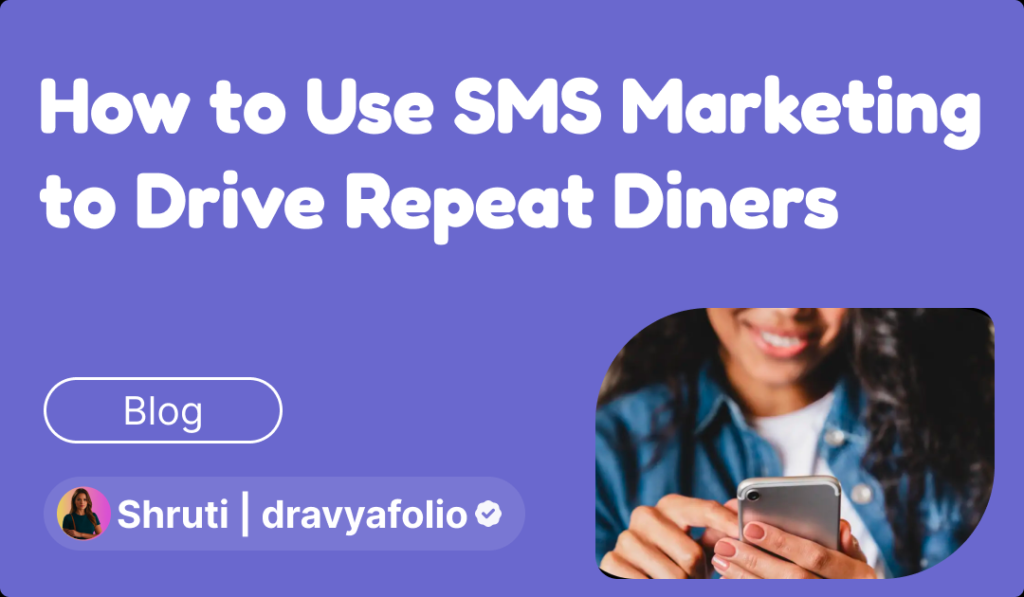
Staying connected with your customers is key for restaurant success. Here’s how to leverage targeted text campaigns
Crafting the right messages to keep customers coming back is a crucial part of any diner retention strategy. SMS marketing — also known as text message marketing — puts those messages directly into the palm of your diner’s hands, and data shows that it’s effective. In fact, text messages have an average 97% read rate within 15 minutes of delivery combined with an average click-through rate of 20-35%.
Whether you’re looking to drive more online orders or bring back a past guest with the enticement of a discount, there’s a lot to explore in the world of SMS marketing. We’ll cover when it’s appropriate to leverage text messages to connect with your diners, overall best practices, and what to look for in an SMS marketing tool when you’re ready.
Why Restaurants Should Use SMS Marketing
What exactly is the excitement around SMS marketing all about? First, it’s a good way to diversify your marketing efforts, especially when email marketing and social media are becoming increasingly saturated channels. Plus, for restaurants that only have a diner’s phone number, this is the best way to reach them and stay connected.
Second, you’re in direct communication with your customers. There’s no need to fight an algorithm to reach your audience. Better yet, you’re meeting diners where they’re at: already on their phone, in their text messages. Lastly, the segmentation that’s available with SMS marketing means you can create highly personalized messages based on past orders and preferences.
When to Use SMS Marketing
You can collect diner phone numbers using various methods. A few of the most popular ways are to create opt-in opportunities during the following transactions:
- Online ordering checkout
- Catering checkout
- Reservations
- Gift card sales
- Merchandise sales
Once you have your system for collecting diner information, you can start to think about what types of messages you’d like to send to deepen your diner relationships. Below are a few ideas to get you started.
New Menu Items
Releasing a seasonal menu? Announcing a limited-time dish? These are great examples of when to use SMS marketing. Build excitement with your diners by keeping the messaging upbeat and enticing with a strong call-to-action like booking a reservation or placing an order. You can even include a photo in your message to give a visual of the new menu item.
Special Offers
Discount codes to prompt a return visit are a go-to for SMS marketing. It’s a nice way to acknowledge a past diner and reward them on a future order. Consider personalizing the message with a first name field to keep it look authentic and natural. Other offers like a free appetizer or dessert during a next visit could also work well.
Birthday Discounts
If you collect birthday information as part of your opt-in process, you can send a targeted message for your diners referencing their birthday month or day. Everyone likes to be celebrated on their birthday, so this is a nice touch for keeping your customers happy and creating a hospitable experience that’s memorable.
SMS Marketing Best Practices
1. Clearly identify yourself.
Make it known what restaurant is sending the message. Integrate your restaurant’s name into the message so that diners know who the information is coming from.
2. Keep messages relevant, valuable, and personal.
Because SMS marketing is a powerful tool, it’s crucial that it isn’t overused. Ensure you’re offering something of value in the message — like a discount or new menu details. Additionally, make it personal. Use the receiver’s first name when possible. It’s an added touch that shows customization and feels friendly.
You should be able to answer yes to these four questions:
- Is this the best way to reach out with this offer?
- Is this relevant to the diner based on known preferences or past orders?
- Am I offering value? (a discount, new information)
- Have I personalized this message?
3. Create immediacy.
Make it easy to act by including a link to drive behavior. This could mean directing diners to your online ordering or reservations page. Above all, you want to streamline the process for someone to take action and simplify how many clicks are needed to complete a transaction.
4. Diversify the type of messages.
Mix it up! Don’t send too much of the same type of content. Think about an annual schedule of messages that you might want to send and start plotting out key promotions that you can run. Remember, each message can include up to 140 characters so keep the language short and sweet.
5. Don’t send too many.
As with any new tool, it’s common to get excited at the beginning and overextend yourself. Only send messages when you have something that really benefits from immediacy, like a day-of promotion or a birthday message. This will help keep your bandwidth under control as well as ensure diners aren’t bombarded with texts. A maximum of 4 messages per month is the recommendation — and that’s only if you have a good mix of diverse and customized content.
6. Be mindful of the send time.
Marketing text messages should only be delivered during certain hours to stay in compliance with a lot of messaging systems. Typically, these are limited to hours between 8am and 9pm. Time your messages accordingly with the promotion.
For example, a birthday message sent day-of will perform best first thing in the morning so the diner has the full day to take advantage of the discount. A promotion for a free appetizer during lunch might work well around 11am as people are starting to think about their lunch plans.
Pro Tips for Restaurant Marketing
Stand out, sell, repeat. Learn what it takes to make a restaurant stand out online, and how to keep diners coming back.
What to Look for in an SMS Marketing Tool
Picking the right platform to use for your SMS marketing is just as important as following best practices and understanding the right cases for this tactic. When making a purchasing decision, here are some questions to ask.
Business Booster Program
Best package for Small, middle size business who are struggling to manage their work efficiently and grow to a minimum of $10,000 per Months.
https://dravyafolio.me/hospitality/
Is a separate system required?
There are many stand-alone SMS marketing platforms out there. However, this approach creates siloed data and often makes it challenging to pull this information into your other systems. Some hospitality-specific tools, like the dravyafolio’s Marketing & Commerce Platform, have SMS marketing integrated into the offerings which makes it easier to use just one system for all marketing activities.
What metrics are available to track?
An ideal SMS marketing tool should show you the following:
- Total messages sent
- Monthly message limit
- Open rate
- Click through rate
- Opt-out rate
- Revenue generated
These six stats will give you a good sense of how your messages are performing. Total messages sent and your monthly message limit will give you a benchmark for how you’re using this channel and quantify the lift needed each month.
Open rate and click through rate will tell you how effective the language is in your message. Do people even open the text message? Are they clicking through to take an action? These are your engagement metrics.
Opt-out rate shows the percentage of people who unsubscribe from your text messages. A high opt-out rate can indicate that your messages are missing the mark somewhere. You might be sending too many, or the message itself isn’t resonating with your audience.
Lastly, it’s always helpful to connect marketing activities to sales and revenue generated tells you just that. Depending on how you’ve set up your SMS marketing, revenue generated can tell you the total amount of money spent through online orders, reservations, merchandise, gift cards, etc. that can be attributed to your text messages.







